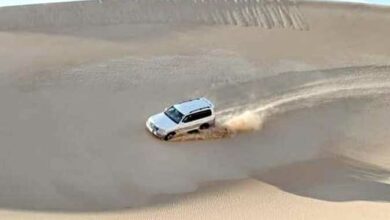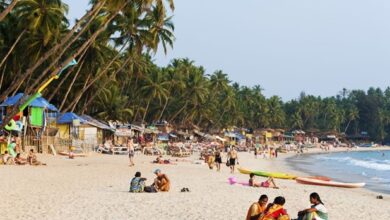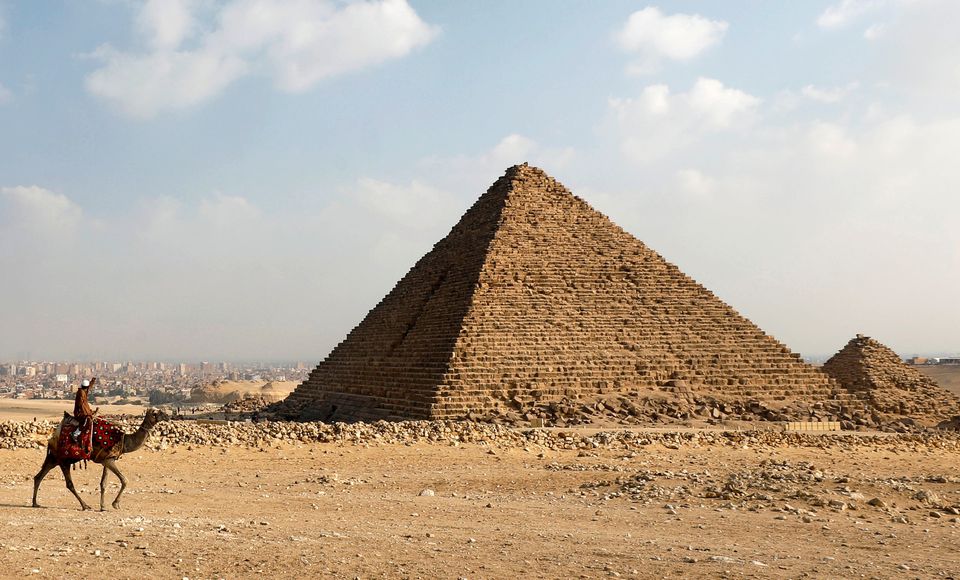Sharm el-Sheikh–One day after the South Sinai Governorate banned diving in Sharm el-Sheikh, the city–considered one of the main diving centers in the world–cut a somber figure. Many tourists were saddened to lose the opportunity to dive in one of the most captivating and famous diving spots in the world. Workers consider the safety measures a threat to their livelihoods.
Anger was thinly veiled at many dive shops, where owners said the ban was the result of poor planning and would harm tourism.
The governorate, which is under pressure to maintain the local economy while keeping tourists safe, loosened the ban a day after it was implemented. Experienced divers were allowed into the water Thursday, easing a bit of the tension.
The normally leisurely ambiance of the city was replaced with a faint anxiety that surrounded the otherwise jubilant divers as they set out on the first day of diving. Al-Masry Al-Youm was on hand to monitor their reactions above and below the water.
Divers of different nationalities skipped down to the docks to dive in the area where beachgoers recently witnessed five shark attacks in a span of less than two weeks. Bolstered by this added sense of “adventure” and the experience level of the group, most were eager to maintain the upbeat tone and avoid any talk of the incidents.
One of the few privileged groups allowed to take in Sharm’s coveted diving sites, the group, which included ten British, four French and two Spanish divers, strolled through Sharm’s streets headed toward the water.
Thus far, the attacks have been on surface swimmers and snorkelers.
“I don’t know if it’s safer for divers or not, but I’m happy I can dive,” said Barry, a 39 year-old from England.
Vikki, the group’s instructor and guide for the day, gave the standard dive brief of the site, Tiran Island’s Gordon Reef. She avoided any mention of the sharks in her upbeat briefing, but did mention certain precautions that are mostly taken for sharks and currents, “watch out for my signal to stick to the reef or the seabed… in case the current gets rough.” None of the divers ventured to be the first one to mention sharks.
Sitting behind the divers, the boat’s skipper, Khamees whispered, “God protect us, if another incident happens, it would be a disaster for us and our families.”
Vikki entered the water first to check the current before giving the other divers the sign to follow.
Khamees who, along with the rest of the crew, hails from the Bahaira Governorate, sat pensively at the helm of the speed boat, deeply inhaling his cigarette. “The day they banned diving, I immediately began thinking of the worst case scenario that I wouldn’t be able to feed my family, and I prayed for the best,” he said. “Normally, we see between 250 and 300 boats out at sea with divers in these parts. I don’t think we saw more than 15 today, because they’re afraid of shark attacks,” the fifteen-year veteran added.
“They say it’s because of overfishing. Then why don’t they stop it? It’s still going on even today,” Khamees said, pointing to the small fishing boat carrying three young men near the reef.
Between the dives at Gordon and Jackson Reef–both named after admirals in the British Royal Navy–the divers engaged in the traditional mid-day diving banter enhancing the camaraderie that a shared activity can create. With the exception of the absence of other boats crowding the area, all seemed in order.
Almost on cue, an approaching ship carrying a TV news crew halted the flow of conversation. “They’re definitely talking about the sharks,” said Sam, who is on his fifth diving trip to Sharm.
The presence of the crew and the business-casual presenter opened the floodgates of shark attack talk.
“Attacks in and of themselves aren’t worrying, it’s the recurrence of the incidents in the same place that is,” said Latetia, an experienced oceanographer.
“My family called me to plead with me not to dive when they heard of the incidents,” said David a Manchester City policeman. “In the end, I figured the diving guides must be as fearful for their lives as I am of mine, so I decided to dive.”
Juan, another diving instructor on the trip quipped, “the worst thing about Sharm diving is that it doesn’t have enough sharks anymore. In Marsa Alam, diving is a real pleasure because you’re surrounded by all types of sharks, and you’re not just limited to beautiful scenery. Sharks are like dogs, they smell fear. Just don’t give him your back, and maybe throw something at him, if he approaches.”
Diving centers have been anxiously awaiting news from the Ministry of Tourism about when normal diving activities can resume.
Andrea, an instructor with one of Sharm’s largest diving centers said, “we do not know anything and do not understand how the government is dealing with the situation. They banned diving one day, then went back to allow it. Now it’s just the experienced divers with more than 50 dives who can dive. Don’t ask me what will be the case tomorrow.”
As the divers went on their second dive, the staff, Hassan and Abu Rabei, prepared lunch.
“Diving centers are still waiting to see how much the shark attacks will affect business. The divers who were here when the attacks happened are still here, so we still have clients,” Abu Rabei said. “We need to wait until next week to know if it will actually affect our work.”
Hassan enthusiastically intervened, “We heard that Israel sent these sharks. But I think it’s a message from God, because there’s too much injustice going on in our country.” After a brief, pensive silence, he continued, “here there aren’t any bosses who don’t treat their employees unfairly. Even the fish are treated unfairly. This place is a protectorate, but no one cares, they fish anyway.”
It didn’t take long after the second dive, before the shark took center stage in the divers’ conversations again. Angelique, a French journalist and one of the divers, began interviewing the divers regarding their views on the attacks and the restrictions.
“The dive was oddly more enjoyable than usual,” Deborah from England said. “Usually diving in Sharm means being crowded with other divers underwater, making sure you don’t bump into anyone. There’s proper traffic usually, like an underground mall. This time it was just us.”
On whether or not she contemplated how she would react if she saw a shark, Deborah said, “I have thought about it. Despite having quite a lot of experience, the thought did scare me.”
Angelique and other divers noted how many times they took an extra glance into the blue, and how she herself kept looking behind her, “just to check.”
Another diver Gary exclaimed that he had seen a shark the day before in Ras Mohammed. “The diver behind me was frantically pointing to the right, and sure enough, there was a shark that at first glance looked like an oceanic white tip,” he said. The oceanic white tip, is one of the two sharks thought to be responsible for the attacks. The other, a mako, was already captured and killed by the Egyptian authorities.
At that time, Vikki, their guide on that dive also, told all the divers to cluster and approach the reef. She circled them all and made sure no one was panicking and the divers also took pictures. The diving center later confirmed that the shark was a silver tip doppelganger.
“We were more than a little afraid,” Gary joked. “The water did change color around us, and it wasn’t red.”
On Thursday’s trip the divers did not see any sharks during their two dives, but Gary remained optimistic, “let’s hope for one on the third.”




